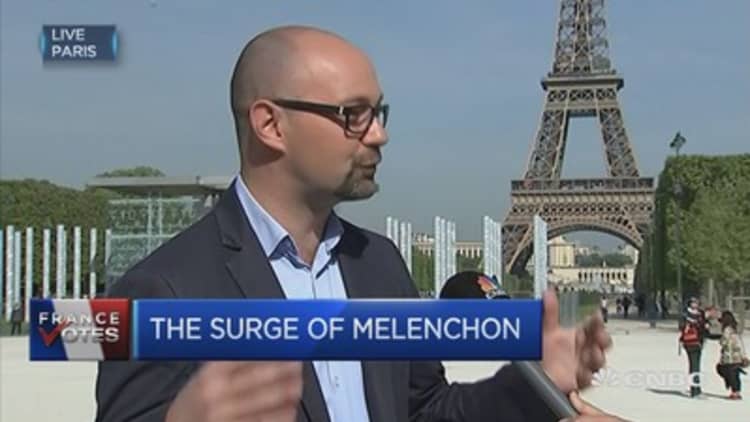The dramatic twists and turns evident throughout the French presidential campaign have seen markets continue to gyrate in reaction to the center stage entrances and exits of leading candidates over the past several months.
Using hedge fund analytics tool Kensho, CNBC crunched some numbers to show how stock indexes in Europe have historically performed following the first round of French presidential elections. The data set shows the average return following the primary round of three different elections in France, dating back to 2002.
According to the numbers, the CAC 40 index which was constituted in 1987 from equity securities representing the 40 largest companies by market capitalization on the Paris bourse, has a thoroughly mixed track record in the two trading sessions immediately following the first round vote. Of the three instances studied, the index posted a negative return of -0.69 percent in 2002, a mildly positive return of 0.51 percent in 2007 and a stellar result of 4.36 percent in 2012.
The FTSE 100 has historically posted directionally similar but more muted results in the two days following the French presidential first round vote, also delivering a negative result in 2002 and a positive result in 2012. In both instances, however, the returns were much closer to the zero bound than seen on the CAC 40. Returns delivered by the FTSE MIB were directionally aligned with the CAC 40 in all three years of recorded data but slightly higher each time, including in 2012 when the Italian index notched up an impressive 5.47 percent return over the two sessions.
Belgium's and Germany's key benchmarks demonstrated no discernible trend over the periods analyzed either with regards to the performance of the CAC 40 or to the political event in France itself.
Turning to currency, Kensho data indicates that the euro has been buoyed in the two-day aftermath of the first round of the French election versus the U.S. dollar in the three occurrences observed since the currency's launch in 1999. The uplift remained within a reasonably tight range with an average return for the three periods of +0.44 percent. The euro also traded higher against the safe-haven each time, delivering an average upside of +0.43 percent.
While the data is interesting, the outsized influence of the wave of geopolitical events that have pounded markets in the past year caution against reading too much into historical outcomes and attempting to extrapolate what will happen this time around. As the world keeps a wary eye on the unstable state of relations between the U.S., North Korea, Russia and Syria, as well as political and economic dynamics within individual nations, especially those grappling with Brexit, traders will be processing many inputs in deciding how to trade in the days following the vote.

With regards to the specific factors at play in the French first round, the market's expectation is for centrist Emmanuel Macron and far-right Marine Le Pen to sail through into the deciding face-off to take place on May 7. Should an upset occur whereby, for example, Macron is eliminated at this hurdle, leaving Le Pen to meet with far-left candidate, Jean-Luc Mélenchon, French risk assets are likely to post a more extreme downside reaction. Independent research house Vanda Securities has put the odds of this eventuality at 11 percent in a recently published note.
The markets are pricing in a relatively low probability of a Le Pen victory, according to Jordan Rochester, FX strategist at Nomura, in recent research.
"If Marine Le Pen fails to gain as many votes as expected from the first round then the market will likely reduce the event risk for the second round considerably and EUR would rally," he began.
"On the flipside, if she gains more votes than expected (29 percent or so to be meaningfully different from the polls) or if even more surprisingly if Mr Macron fails to make it into the second round then we think the market will seriously reassess the risks," continued Rochester, positing that the euro would likely sell off and the spread between French and safe haven German government bonds would widen in such a scenario.


